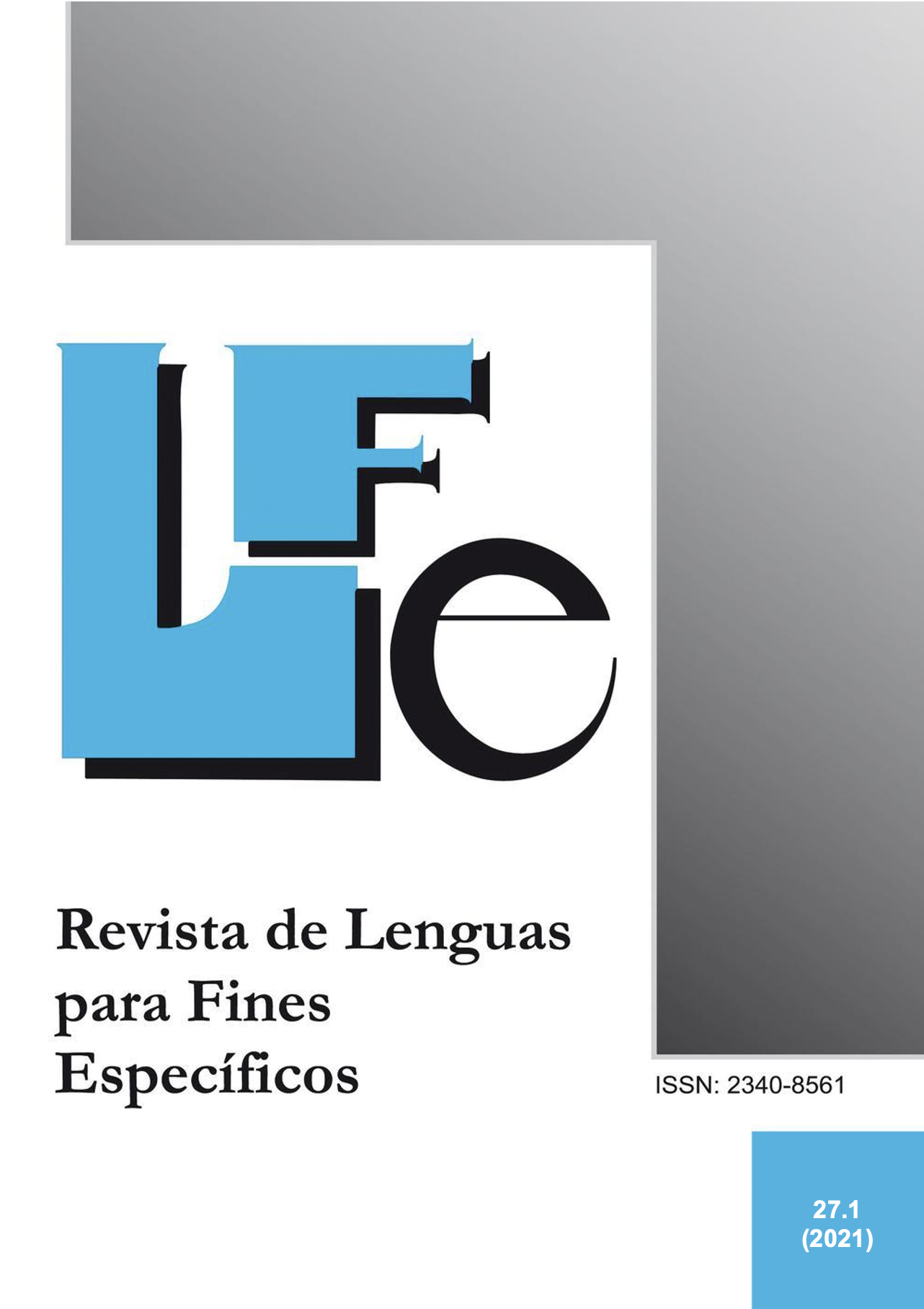The influence of the foreign language certificate regulation on motivation among undergraduates
Keywords:
EFL, motivation, foreign language certificate regulation.Abstract
This paper aims to analyse the extent to which the latest changes to the foreign language certificate regulation have influenced undergraduates’ motivation to learn English, especially among final year students at the Centro de Magisterio La Inmaculada. The main reason why we focused on the students in question is the fact that they are divided into different groups depending on their major subject (Science, English, Physical Education and Attention to Diversity), which has enabled us to observe four different profiles. Furthermore, we wanted to explore the possible differences between them regarding two main issues: their motivation to study English as a Foreign Language and their opinions about the change in foreign language regulation at the University of Granada. In order to examine these questions, we created a questionnaire that gathered both quantitative and qualitative data. The results confirmed our hypothesis: the latest regulation has affected students’ motivation towards EFL learning. Now, more than ever, undergraduates opt for learning English to obtain a B1 certificate that will allow them to graduate from University. Moreover, there have been some significant differences between the groups, especially in the case of future English teachers and the rest of specialities.
Downloads
References
Camacho, R. et al. (2012). Motivación, necesidades y expectativas de los estudiantes del Grado en Enfermería en el aprendizaje del inglés como segunda lengua. Index de Enfermería 21 (4), 194-198.
CLM UGR. Examen CLM de Acreditación de nivel B1-B2. https://www.clm-granada.com/lem/es/ingles/examen-b1-b2/normativa-examen.html, [19/02/2020].
Chávez, M., Saltos, M. and Saltos, D. (2017). The importance of learning and knowledge of the English language in higher education. Dom. Cien, 3, 759-771.
Delfín de Manzanilla, B. (2007). Attitude towards English in Higher Education Students. REDHECS, 2, 1-35.
Dörnyei, Z. (1990). Conceptualizing Motivation in Foreign-Language Learning. Language Learning 40 (1), 45-78.
Dörnyei, Z. (1994). Motivation and Motivating in the Foreign Language Classroom. The Modern Language Journal, 78 (3), 273-284.
Dörnyei, Z. (1998). Motivation in second and foreign language learning. Language Teaching, 31(3), 117-135.
España Chavarría, C. (2010). The English Language in University Curriculum: Importance, Challenges and Achievements. Revista Electrónica Educare, XIV (2), 63-69.
Gardner, R.C. and Lambert, W.C. (1972). Attitudes and Motivation in Second Language Learning. Rowley, MA: Newbury House.
Gardner, R.C. (1985). Social Psychology and Second Language Learning, The Roles of Attitudes and Motivation. London: Edward Arnold.
Gardner, R.C. (2007). Motivation and Second Language Acquisition. Porta Linguarum, 8, 9-20.
Genz, B. (2009) Effect of technology on motivation in EFL classrooms. Turkish Online Journal of Distance Education-TOJDE, 10 (4), 136-158.
Lahuerta Martínez, A. (2015). Análisis de las razones para estudiar una lengua extranjera y la motivación en un contexto universitario español. E-Aesla, 1, available from https://cvc.cervantes.es/lengua/eaesla/eaesla_01.htm, [10/10/2019].
Junta de Andalucía. Ayudas a la acreditación de idiomas B1 o superior. https://www.juntadeandalucia.es/organismos/economiaconocimientoempresasyuniversidad/areas/universidad/talento/paginas/ayudas-acreditacion-idiomas.html, [19/02/2020].
Matsuzaki Carreira, J. (2005). New Framework of Intrinsic/Extrinsic and Integrative/Instrumental Motivation in Second Language Acquisition. The Keiai Journal of International Studies, 16, 39-64.
Minera Reyna, L. (2009). El papel de la motivación y las actitudes en el aprendizaje de E/LE en un contexto de enseñanza formal para adultos alemanes. Revista Nebrija de Lingüística Aplicada, 6 (3), 58-73.
Minera Reyna, L. (2010). El cuestionario MAALE, técnica para recolección de datos de las variables afectivas motivación y actitudes en el aprendizaje de una lengua extranjera. redELE, 19. https://sede.educacion.gob.es/publiventa/detalle.action?cod=20263, [01/11/2019].
Ministerio de Educación y Formación Profesional. Enseñanza de Lenguas Extranjeras. http://www.educacionyfp.gob.es/servicios-al-ciudadano/estadisticas/no-universitaria/alumnado/lenguas-extranjeras/2017-2018.html, [12/02/2020].
Navarro Pablo, M. and García Jiménez, E. (2018). Are CLIL Students More Motivated? An Analysis of Affective Factors and their Relation to Language Attainment. Porta Linguarum, 29, 71-90.
Pan, C. and Wu, H. (2013). The Cooperative Learning Effects on English Reading Comprehension and Learning Motivation of EFL Freshmen, English Language Teaching, 6 (5), 13-27.
Peacock, M. (1997). The effect of authentic materials on the motivation of EFL learners, ELT Journal Volume 51 (2), 144-156.
Pfenninger, S. (2016). All good thing come in threes: Early English learning, CLIL and motivation in Switzerland, Cahiers de I’ILSL, 48, 119-147.
Richards, J. and Schmidt, R. (2002 [1985]). Longman Dictionary of Teaching and Applied Linguistics. London: Pearson Education Limited.
Saravia, E. and Bernaus, M. (2008). Motivación y actitudes para el aprendizaje de lenguas de dos colectivos de estudiantes universitarios: futuros maestros de lenguas extranjeras y futuros enfermos y fisioterapeutas. Porta Linguarum, 10, 163-184.
Stockwell, G. (2013). Technology and Motivation in English-Language Teaching and Learning. Iin E. Ushioda (ed), International Perspectives on Motivation. Language Learning and Professional Challenges (pp. 156-175). Basingstoke: Palgrave Macmillan.
Universidad de Granada. Procedimientos para el Reconocimiento de la Acreditación de Lenguas Extranjeras. https://www.ugr.es/universidad/normativa/acg1436-procedimiento-para-reconocimiento-acreditacion-lenguas-extranjeras-universidad-granada, [19/02/2020].
Universidad de Granada. Tablas de certificados oficiales aceptados por la Universidad de Granada para la acreditación de lenguas extranjeras y su correspondencia con el MCERL. https://internacional.ugr.es/pages/politica-linguistica/tablasdecertificadosaceptadosporlaugr, [19/02/2020].
Ushioda, E. (2013). Motivation and ELT: Global Issues and Local Concerns. In E. Ushioda (ed), International Perspectives on Motivation. Language Learning and Professional Challenges (pp. 1-17). Basingstoke: Palgrave Macmillan.
Downloads
Published
How to Cite
Issue
Section
License
Authors who publish with this journal agree to the following terms:
- Authors retain copyright and grant the journal right of first publication with the work simultaneously licensed under a Creative Commons Attribution License that allows others to share the work with an acknowledgement of the work's authorship and initial publication in this journal.
- Authors are able to enter into separate, additional contractual arrangements for the non-exclusive distribution of the journal's published version of the work (e.g., post it to an institutional repository or publish it in a book), with an acknowledgement of its initial publication in this journal.
- Authors are permitted and encouraged to post their work online (e.g., in institutional repositories or on their website) prior to and during the submission process, as it can lead to productive exchanges, as well as earlier and greater citation of published work (See The Effect of Open Access).

Revista de Lenguas para fines específicos is licensed under a Creative Commons Reconocimiento-NoComercial-SinObraDerivada 4.0 Internacional License.
























